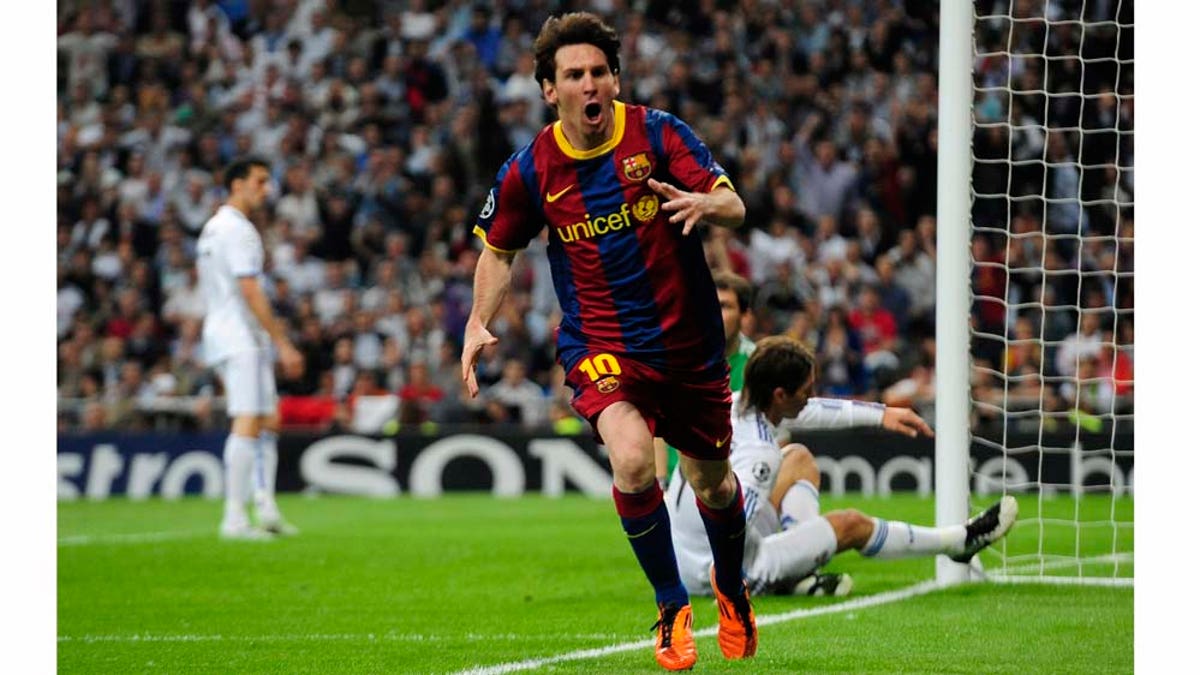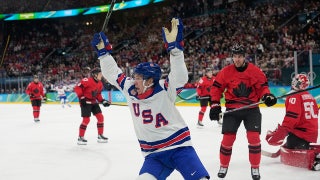
FC Barcelona's Lionel Messi from Argentina reacts after scoring against Real Madrid during their semifinal first leg Champions League soccer match at the Bernabeu stadium in Madrid, Spain, Wednesday, April 27, 2011. (AP Photo/Manu Fernandez) (AP2011)
On Tuesday, former Spanish international striker Raúl announced he had donated his shirt and the ball with which he scored his 400th career goal to a soccer museum in Germany. Raúl, who plays for Schalke 04 in the Bundesliga, tallied that goal in a 4-0 victory over Wolfsburg on Feb. 19.
In this day and age of "if you haven't done something within the last 15 minutes you are forgotten," you just might remember Raúl. He was the prolific forward who helped spur Real Madrid to dominance in Spain's La Liga and to three UEFA Champions League crowns, before he was deemed over-the-hill in 2010 for Real, which desired more European glory.
He is now 34-year-old and nearing the end of a wonderful career.
As impressive as Raúl's accomplishment has been, at the rate Lionel Messi is scoring goals these days, the Argentine striker could come close to surpassing that figure before the 2014 World Cup kicks off in some in a little more than two years from now.
What makes it even more astounding is that the Messi has not yet turned 25 (his birthday is June 24).
Best Pix of the Week
Last week Lionel Messi added another chapter or two to his growing legend.
On Wednesday, March 8, he connected for five goals in Barca's 7-1 demolition of Bayer Leverkusen, the first time anyone struck for five goals in a UEFA Champions League match. Who else but the magnificent Messi could have pulled off that feat?
On Sunday, he scored "only" twice in Barca's 2-0 La Liga win over Racing Santander, moving five goals closer to Barca's all-time record of 235, held by César Rodríguez. He is on a ridiculous pace, long range and short. He has put away a sweet 16 goals in his last six appearances for club and country. Last season he tallied 53 goals in 55 matches. This season he has taken it to yet another level with 50 goals in 43 games and there is another weeks remaining in the season.
Mind-boggling numbers.
Then again, you can use the same descriptive phrase for his résumé.
With Barca, Messi has been accrued five La Liga titles, three Champions League crowns, two UEFA SuperCup championships, a pair of Club World Cup titles and one Copa Del Rey and one Supercopa de España.
Just about the only thing missing from his medal case is one from the World Cup. To be thought as one of the greatest to have played the game -- and I'm talking about the likes of Pelé, Diego Maradona and Frank Beckenbauer -- is to be in the loftiest of company.
If there is one thing that tarnishes the legend, it is Messi's international success or lack thereof. As great as his has been, Messi and his legend can be even greater.
Best Sports Pix of the Week
Like it or not, Messi, the international player, pales in comparison with Messi, the Barca player. For his country, he has scored 22 goals in 67 appearances, decent numbers, but none fitting someone who has racked up goals and titles for his club. Moreover, Argentina has failed to earn any significant honors with Messi on the team, whether it was last year's disappointing meltdown at Copa América (which the Argentines hosted) or at the 2010 World Cup.
Messi is probably better suited to play for Barca because the players that surround the magician complement and supplement him. Another theory is that he has not been used correctly by his National Team (case in point: former Argentine coach Diego Maradona in South Africa two years ago).
Messi and Argentina will have another opportunity to put such underachieving thoughts behind them at the 2014 World Cup. The competition will be held in Brazil, and if you go by soccer history, home continent advantage matters most, especially for European teams playing in South America and vice versa.
In fact, only one South American side has danced with the World Cup trophy across the Atlantic and that was the marvelous 1958 Brazilian team that introduced a 17-year-old Pelé to the international scene in Sweden. No Euro team, I repeat, no Euro team, has ever won in the Western Hemisphere (Uruguay won at home and in Brazil in 1930 and 1950, Argentina prevailed at home in 1978 and in Mexico in 1986 and Brazil took it all in the United States in 1994).
So, in two years time in Brazil, the stars of the soccer universe could very well be in order to do it. Messi will be 27 and probably at the height of his game.
According to a soccer players' biological clock, a striker's prime years are usually between the ages of 25-30. Those are the years when a striker has the pace and strength before, like it or not, age and injuries start creeping in.
Unfortunately, the specter of an aging soccer player tends to strike, well, strikers before any other position because they rely on their speed and quickness in today's pacey game to get that half step on a marker. You lose that precious advantage and you become an average forward, someone who might be able to score goals for a club team , but perhaps not at the same pace on the world stage.
According to my research, the average age of a World Cup scoring champion is 24.7, so Messi certainly is ripe for a memorable World Cup. As talented as he is, winning a World Cup is never a one-man show (even Maradona, who dominated the 1986 World Cup like no one before or after, had plenty of help from a talented and hard-working Argentina side). It will depend on Messi and the new generation of Argentine teammates..
Lionel Messi reminds us that size does and doesn't matter. It doesn't matter if you are not a hulking 6-2 forward, a target man who is ready to head home any thing that is airborne his way. Nothing wrong with that.
But when you're Messi's height, not many coaches are willing to take chances with a 5-6 forward.
His skill, quickness in close quarters, ability to shuffle and run sideways through traffic and his vision have made him devastating. Add such talented teammates as Xavi Hernandez, Andres Iniesta, Javier Mascherano and Cesc Fabregas and you've got an even more lethal weapon at Barca's disposal (yes, Barcelona trails Real Madrid by 10 points and needs a miracle to catch its La Liga rivals).
Messi is always entertaining to watch. How will be beat his opponent this time? Which teammates will collaborate with him on a goal? Will he scored in bunches? Or will one special goal become a Wow! moment that will live on in our minds forever?
When you say such things about a player, you realize he is more than special, perhaps bordering on super-human.
Even so-called super human players have not celebrated of parading around with the FIFA World Cup trophy. The likes of Johan Cruyff, Frenec Puskas and Michel Platini come to mind, among others.
Regardless how he fares in the World Cup, Messi always will be considered a great one.
But with a World Cup and medal in tow, he will hailed as one of the greatest.
Michael Lewis, who has covered international soccer for more than three decades, can be reached at SoccerWriter516@aol.com.








































